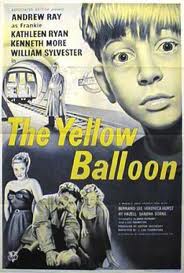The Yellow Balloon (film)
| The Yellow Balloon | |
|---|---|
 |
|
| Directed by | J. Lee Thompson |
| Produced by | Victor Skutezky |
| Written by | Anne Burnaby J. Lee Thompson |
| Starring | Andrew Ray; William Sylvester |
| Music by | Philip Green |
| Cinematography | Gilbert Taylor |
|
Production
company |
|
|
Release dates
|
10 February 1953 (UK) |
|
Running time
|
76 minutes |
| Country | United Kingdom |
| Language | English |
| Box office | £116,245 (UK)[1] |
The Yellow Balloon is a 1953 British drama film starring Andrew Ray, William Sylvester , Kathleen Ryan, Kenneth More, and Hy Hazell.[2][3]
Plot
The scene: London's East End. When 12-year-old Frankie Palmer (Andrew Ray) loses the sixpence his father has given him to buy a large yellow balloon from a street seller that the boy has set his heart on, he sees that a friend of his, young Ronnie Williams (Stephen Fenemore) has already bought one and Frankie snatches it off him and runs off with it, with Ronnie in hot pursuit. Ronnie chases Frankie into a large, bombed-out house and they are running about in the ruins when Ronnie slips and falls thirty feet to his death. Frankie scrambles down to help, but realises that there is nothing he can do. Hiding in the shadows and seeing it all, Len Turner (William Sylvester), a criminal on the run and using the ruins as a hideout from the police, convinces Frankie that the police will arrest the boy and charge him with the murder of his friend for pushing him to his death and that they must both make their getaway. Although Frankie and Len agree it was an accident, Len is adamant that the police will not see it that way and Frankie goes off with him. Len blackmails Frankie into stealing money from his parents (Kenneth More and Kathleen Ryan) to help fund Len's escape and then uses the boy as a decoy in a pub robbery that goes horribly wrong when Len murders the pub owner. Realising that Frankie is the only witness to his crime, Len knows he must kill the boy, too. This develops into a terrifying hide-and-seek chase through a bomb-damaged, abandoned and highly-perilous London Underground station, with Len hot on the heels of Frankie, who is desperately trying to escape with his life.
Reception
The Yellow Balloon was one of the first films to be passed with the then new Adults Only "X" certificate by the British Board of Film Censors, which barred anyone under the age of 16 years from being allowed into a cinema to see the film. This was because the censor felt that the chase through the Underground station in the last reel would be very frightening for young children and Andrew Ray, 13-year-old when the film was shot in 1952 and 14-year-old when it was released in May, 1953, was disappointed that he wasn't allowed to go into a cinema to see his own film because he was under the age of 16. However, after complaints from cinema exhibitors that the "X" certificate wasn't really necessary for the film and it was losing them the family audience they had relied on up until that time, the BBFC eventually relented and in October, 1953, they re-classified the film with an "A" certificate (children under 16 allowed in to see the film if accompanied by an adult).
Cast
- Andrew Ray as Frankie Palmer
- Kathleen Ryan as Emily Palmer
- Kenneth More as Ted Palmer
- Bernard Lee as PC Chapman
- Stephen Fenemore as Ron Williams
- William Sylvester as Len
- Marjorie Rhodes as Jessie Stokes
- Peter Jones as Sid
- Eliot Makeham as Pawnbroker
- Sid James as Barrow Boy
- Veronica Hurst as Sunday School Teacher
- Sandra Dorne as Iris
- Campbell Singer as Potter
- Laurie Main as Bibulous Customer
- Hy Hazell as Mary
Critical reception
In The New York Times, Bosley Crowther wrote, "it is a leisurely sort of chiller that trades intriguingly upon a youngster's far-fetched fears...The moral is, of course, that children should speak up rather than harbor their fears. But they don't. So probably the British will be able to go right on making these variably fascinating films for years." [4]
References
- ↑ Vincent Porter, 'The Robert Clark Account', Historical Journal of Film, Radio and Television, Vol 20 No 4, 2000 p502
- ↑ http://www.imdb.com/title/tt0046561/
- ↑ Lua error in package.lua at line 80: module 'strict' not found.
- ↑ Lua error in package.lua at line 80: module 'strict' not found.